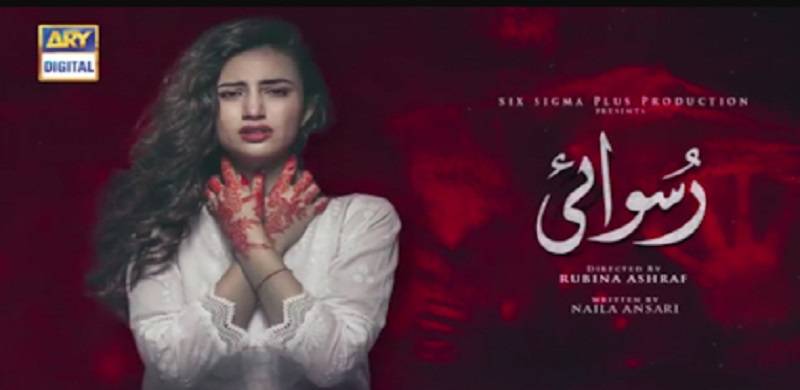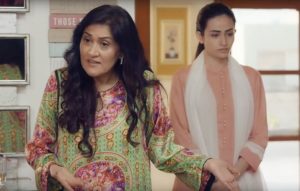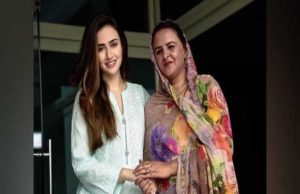
‘Ruswai’ started off as a drama about a victim of gang rape, but it veered of the main track to take a side tour into what Pakistani drama producers consider the ratings: rich fields of petty family politics.
Dr Samira (Sana Javed) is in love with Salman (Mikal Zulfikar) and they are engaged, but despite the long-standing friendship between their fathers, somehow their relationship has not reached a point where anyone can agree on a date for an actual wedding.
The biggest obstacle is Salman’s mother played by Irsa Ghazal, who is the archetypal possessive, materialistic, elite class mother that haunts Pakistani drama scripts.

To complicate matters further, Salman’s sister Warda (Minna Tariq), is in love with Samira’s brother, Hamza (Osama Tahir), and they are getting married before Sameera and Salman. All their plans for the future are upturned when Samira is kidnapped at gunpoint and later gang-raped. Relationships are tested and the hidden fault lines between each protagonist open up like gaping chasms.
Ruswai was touted as a socially focused drama with both cast and writer giving interviews about how important the topic was. Actress Sana Javed was particularly proud of having given an organic performance without making the effort of any research or talking to a rape survivor.
Meanwhile, writer Naila Ansari explained in an interview that one of the twists in this drama was based on true events, where a father had to make a split-second decision on whether he would save his daughter or daughter-in-law.
Viewers like me were also lulled into a sense of expectation by the recent spate of well-written, insightful dramas like ‘Udaari’, ‘Meri Guriya’ , ‘Inkaar’ and ‘Dar Si Jaati Hai Sila’ that had been made in the recent past that touched on various aspects of sexual assault.
However, ‘Ruswai’ followed a disappointingly trajectory in which the needs of the victim were ignored but the feelings of those around her were explored in detail. Any hope that this might be another clarifying take on the issue soon dissolved when one of the main scenes showing the victims return gave into a sordid melodrama.
After having disappeared for days, Samira is returned, battered and bruised to a family supposedly desperately searching for her. Instead of anyone try to comfort or welcome her, each family member is shown shaking with revulsion and horror at the sight of her. Sometimes it’s the villain that has the most truthful lines and Samira’s reluctant mother-in-law says what everyone hopes : it would be better for everyone if Samira had just died.
Fast forward ten episodes and Samira has been reviled and rejected by everyone whom she had once thought loved her. Her husband has an affair and is violent with her, her brother ignores her feelings to please his wife and her father trembles with the need for his own forgiveness rather than his daughter’s healing. The women are no better as her sister in law sees her as an inconvenience. Her mother asks her to put up with domestic violence so her brother’s new life isn’t disturbed and her sister suddenly starts to cheat on exams and even overdoses from ‘the pressure’ of the family . In this maelstrom of emotions no one least of all the writer or the director is interested in the victim’s feelings, her recovery or resolution.
The only positive force in the serial is Samira’s brusque new colleague Dr Feroz (Adnan Jaffer) whose more practical approach helps Samira regain some sense of self. The rest of the serial is then wasted on the usual small-minded turf wars of Saas -Bahu and Salman’s inability to accept Samira’s new reality.
Having exhausted that avenue , the director Rubina Ashraf turned her focus on the other couple in the story giving us the painstaking portrait of why Watta satta or exchange marriages cause so much misery.
After Samira’s suffering viewers were treated to 10-plus episodes of revenge where Warda is humiliated and punished by Samira’s family culminating in the errant Salman’s death.
By the end of the play two people are dead, Samira’s father and Salman , and the message is clear, forget the victim. It is the people around her that suffer the most.
What ‘Ruswai’ did get right was Samira’s stress and trauma, and yes it can sometimes be the case that a husband or relative cannot think beyond themselves enough to help a victim, but that isn’t inevitable. Where one relationship had failed why not show some mature, compassionate adults that can support the victim? A romantic element is not always necessary – sometimes the support of a friend can make all the difference.
What ‘Ruswai’ got wrong apart from the shift in focus to the home front were the basic details. Despite hailing from a wealthy educated family, Samira’s father will not contact the police or give them her picture. When she does return, they ask her doctor friend to look at her but she is not taken to hospital nor are DNA samples taken. Samira’s parents are not from the 1950s, they are educated, sensible people, so why does her mother ask Samira to put up with being beaten and abused on a regular basis to ‘secure’ everyone’s family life? Samira is a practicing physician and is even shown dealing with a rape case yet neither she nor anyone in her family think of visiting a psychologist or any kind of counselor. It is 2020 and this drama followed all the cliches of a story set fifty or more years ago.
As far as performances go, despite her lack of research Sana Javed gave a solid performance as the much put-upon Samira and made this serial watchable. Mikal Zulfikar is a talented actor but he plays the same weak but good-looking man in serial after serial and it really is time for him to challenge himself with something different.
The other standouts where Osama Tahir and Natalia Awais. Osama Tahir is a fantastic actor with a lot of screen presence , with his talent he will be a household name soon. Natalia Awais’s portrayal was simple and very effective. Both Tara Mehmood and especially Irsa Ghazal are good actresses so it was a huge disappointment seeing them turn their characters into caricatures when there was room for nuance. Minha Tariq needs to work on her craft , especially on her dialogue delivery before someone else makes her the center of a serial again.
‘Ruswai’ ended on tragic note with a remorseful Salman sacrificing himself for Sameera. The ending might have fizzled out, but the now recovered and more balanced Sameera’s meeting with Mukhtaran Mai, the famous survivor of a real-life gang rape was a breath of fresh air. Those scenes were the kind of thing the drama should have concentrated on throughout.

Seeing Mukhtaran Mai happy and whole was an affirmation of the strength, courage and resilience of Pakistani women who fight for their rights as human beings no matter what odds are stacked against them. Those scenes may well have been the best part of the serial.
Sensitive issues like rape have become popular subjects for Pakistani dramas. While this has produced some excellent work where drama makers have understood the responsibility they carry, at times the results have been disappointing. Not everything can be neatly packaged into little boxes for ratings and easy consumption. While dramas are obviously a commercial and artistic venture, if they choose such topics, they also have a burden of obligation towards the real victims of such crimes not to us their pain for profit alone.
Dr Samira (Sana Javed) is in love with Salman (Mikal Zulfikar) and they are engaged, but despite the long-standing friendship between their fathers, somehow their relationship has not reached a point where anyone can agree on a date for an actual wedding.
The biggest obstacle is Salman’s mother played by Irsa Ghazal, who is the archetypal possessive, materialistic, elite class mother that haunts Pakistani drama scripts.

To complicate matters further, Salman’s sister Warda (Minna Tariq), is in love with Samira’s brother, Hamza (Osama Tahir), and they are getting married before Sameera and Salman. All their plans for the future are upturned when Samira is kidnapped at gunpoint and later gang-raped. Relationships are tested and the hidden fault lines between each protagonist open up like gaping chasms.
Ruswai was touted as a socially focused drama with both cast and writer giving interviews about how important the topic was. Actress Sana Javed was particularly proud of having given an organic performance without making the effort of any research or talking to a rape survivor.
Meanwhile, writer Naila Ansari explained in an interview that one of the twists in this drama was based on true events, where a father had to make a split-second decision on whether he would save his daughter or daughter-in-law.
Viewers like me were also lulled into a sense of expectation by the recent spate of well-written, insightful dramas like ‘Udaari’, ‘Meri Guriya’ , ‘Inkaar’ and ‘Dar Si Jaati Hai Sila’ that had been made in the recent past that touched on various aspects of sexual assault.
However, ‘Ruswai’ followed a disappointingly trajectory in which the needs of the victim were ignored but the feelings of those around her were explored in detail. Any hope that this might be another clarifying take on the issue soon dissolved when one of the main scenes showing the victims return gave into a sordid melodrama.
After having disappeared for days, Samira is returned, battered and bruised to a family supposedly desperately searching for her. Instead of anyone try to comfort or welcome her, each family member is shown shaking with revulsion and horror at the sight of her. Sometimes it’s the villain that has the most truthful lines and Samira’s reluctant mother-in-law says what everyone hopes : it would be better for everyone if Samira had just died.
Fast forward ten episodes and Samira has been reviled and rejected by everyone whom she had once thought loved her. Her husband has an affair and is violent with her, her brother ignores her feelings to please his wife and her father trembles with the need for his own forgiveness rather than his daughter’s healing. The women are no better as her sister in law sees her as an inconvenience. Her mother asks her to put up with domestic violence so her brother’s new life isn’t disturbed and her sister suddenly starts to cheat on exams and even overdoses from ‘the pressure’ of the family . In this maelstrom of emotions no one least of all the writer or the director is interested in the victim’s feelings, her recovery or resolution.
The only positive force in the serial is Samira’s brusque new colleague Dr Feroz (Adnan Jaffer) whose more practical approach helps Samira regain some sense of self. The rest of the serial is then wasted on the usual small-minded turf wars of Saas -Bahu and Salman’s inability to accept Samira’s new reality.
Having exhausted that avenue , the director Rubina Ashraf turned her focus on the other couple in the story giving us the painstaking portrait of why Watta satta or exchange marriages cause so much misery.
After Samira’s suffering viewers were treated to 10-plus episodes of revenge where Warda is humiliated and punished by Samira’s family culminating in the errant Salman’s death.
By the end of the play two people are dead, Samira’s father and Salman , and the message is clear, forget the victim. It is the people around her that suffer the most.
What ‘Ruswai’ did get right was Samira’s stress and trauma, and yes it can sometimes be the case that a husband or relative cannot think beyond themselves enough to help a victim, but that isn’t inevitable. Where one relationship had failed why not show some mature, compassionate adults that can support the victim? A romantic element is not always necessary – sometimes the support of a friend can make all the difference.
What ‘Ruswai’ got wrong apart from the shift in focus to the home front were the basic details. Despite hailing from a wealthy educated family, Samira’s father will not contact the police or give them her picture. When she does return, they ask her doctor friend to look at her but she is not taken to hospital nor are DNA samples taken. Samira’s parents are not from the 1950s, they are educated, sensible people, so why does her mother ask Samira to put up with being beaten and abused on a regular basis to ‘secure’ everyone’s family life? Samira is a practicing physician and is even shown dealing with a rape case yet neither she nor anyone in her family think of visiting a psychologist or any kind of counselor. It is 2020 and this drama followed all the cliches of a story set fifty or more years ago.
As far as performances go, despite her lack of research Sana Javed gave a solid performance as the much put-upon Samira and made this serial watchable. Mikal Zulfikar is a talented actor but he plays the same weak but good-looking man in serial after serial and it really is time for him to challenge himself with something different.
The other standouts where Osama Tahir and Natalia Awais. Osama Tahir is a fantastic actor with a lot of screen presence , with his talent he will be a household name soon. Natalia Awais’s portrayal was simple and very effective. Both Tara Mehmood and especially Irsa Ghazal are good actresses so it was a huge disappointment seeing them turn their characters into caricatures when there was room for nuance. Minha Tariq needs to work on her craft , especially on her dialogue delivery before someone else makes her the center of a serial again.
‘Ruswai’ ended on tragic note with a remorseful Salman sacrificing himself for Sameera. The ending might have fizzled out, but the now recovered and more balanced Sameera’s meeting with Mukhtaran Mai, the famous survivor of a real-life gang rape was a breath of fresh air. Those scenes were the kind of thing the drama should have concentrated on throughout.

Seeing Mukhtaran Mai happy and whole was an affirmation of the strength, courage and resilience of Pakistani women who fight for their rights as human beings no matter what odds are stacked against them. Those scenes may well have been the best part of the serial.
Sensitive issues like rape have become popular subjects for Pakistani dramas. While this has produced some excellent work where drama makers have understood the responsibility they carry, at times the results have been disappointing. Not everything can be neatly packaged into little boxes for ratings and easy consumption. While dramas are obviously a commercial and artistic venture, if they choose such topics, they also have a burden of obligation towards the real victims of such crimes not to us their pain for profit alone.
